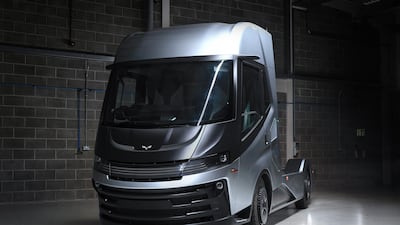A self-driving zero-emission heavy goods vehicle, said to be the world's first, has moved a step closer after $8.3 million (£6.6 million) worth of funding for the project was awarded.
Hydrogen Vehicle Systems (HVS), a UK-based hydrogen-powered commercial vehicle innovator, is developing the HGV for the UK market through the the consortium it leads, Hub2Hub.
The consortium will create a self-driving heavy goods lorry, which will begin vehicles trials in 2024. Major UK retailer Asda is a strategic partner.
The £12 million ($14.8 million) venture has been selected by the Centre for Connected Autonomous Vehicles (CCAV) as a recipient for its joint industry and government-funded project.
It aims to improve efficiency, safety and bring operational cost savings for logistics operators, plus create new jobs.
"A transport revolution is taking place in the UK and HVS, together with the consortium, is at the forefront of the innovation," said HVS chief executive Jawad Khursheed.
"We are engineering the world’s first autonomous hydrogen-electric powered HGV to demonstrate hub-to-hub logistics to a leading retailer, Asda, to elevate public perception, showcasing the potential autonomy can deliver thanks to increased safety and fuel savings, and develop new business models."
HVS will receive £3.4 million as one of seven grants being announced from the CCAV and Connected and Automated Mobility (CAM) programme.

The consortium will build two prototype vehicles that will allow Level 4 self-driving, which means the vehicle is fully autonomous but a human driver can request control.
The first hydrogen-electric HGV prototype will be fitted with a driver’s cab and tested on the road in autonomous operation, with a human safety driver at the wheel.
The second prototype will have the driver’s cab removed and replaced by an aerodynamic fairing. The vehicle will be evaluated on test tracks with a remote driver.
“In just a few years’ time, the business of self-driving vehicles could add tens of billions to our economy and create tens of thousands of jobs across the UK," said Britain's Business Secretary Grant Shapps.
"This is a massive opportunity to drive forward our priority to grow the economy, which we are determined to seize."
Vehicles running on alternative fuels are part of plans to help countries achieve clean energy targets.
Globally, the hydrogen industry is expected to grow to $183 billion by 2023, from $129 billion in 2017, according to Fitch Solutions.
The development of self-driving vehicles has, however, faced difficulties, with self-driving software systems lacking the ability of humans to predict and assess dangers quickly.
Tesla chief executive Elon Musk said last year that developing self-driving cars was "way harder than I originally thought, by far".
Tesla's Full Self-Driving capability still requires active driver supervision.
"Full autonomy will be dependent on achieving reliability far in excess of human drivers as demonstrated by billions of miles of experience, as well as regulatory approval, which may take longer in some jurisdictions," the Tesla website says.
The company in December entered the lorry market with the delivery of its first all-electric Semi model.


